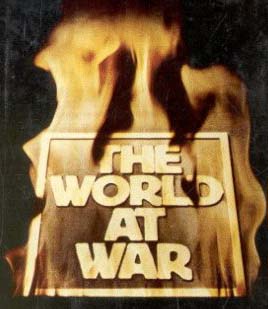
The World at War is a 26-episode British documentary television series that chronicles the events of the Second World War. It was produced in 1973, at a cost of £900,000, the most expensive factual series ever produced. It was produced by Jeremy Isaacs, narrated by Laurence Olivier and included music composed by Carl Davis. The book, The World at War, published the same year, was written by Mark Arnold-Forster to accompany the TV series.
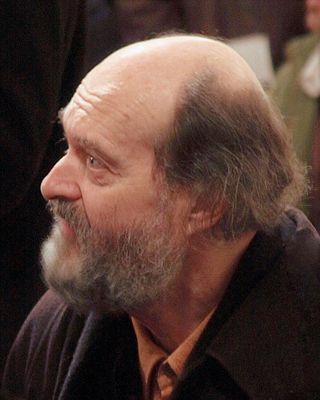
Spiegel im Spiegel is a composition by Arvo Pärt written in 1978, just before his departure from Estonia. The piece is in the tintinnabular style, wherein a melodic voice, operating over diatonic scales, and tintinnabular voice, operating within a triad on the tonic, accompany each other. It is about ten minutes long.
This is a selected bibliography and other resources for The Holocaust, including prominent primary sources, historical studies, notable survivor accounts and autobiographies, as well as other documentation and further hypotheses.
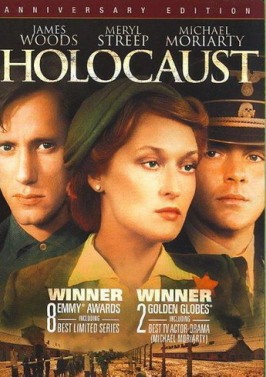
Holocaust (1978) is an American television miniseries which aired on NBC over four nights, from April 16 — April 19, 1978.
Laurence Rees is an English historian. He is a BAFTA winning historical documentary filmmaker and a British Book Award winning author of several books about Adolf Hitler, the Nazis and the atrocities committed, especially by them, during the 20th century. He is the former Head of BBC TV History Programmes.
BBC History of World War II (1989–2005) is a 30-hour, 12-disc collection of 10 BBC television films about World War II. The films include documentaries, docudramas, and "dramatized documentaries".
Fratres is a musical work by the Estonian composer Arvo Pärt exemplifying his tintinnabuli style of composition. It is three-part music, written in 1977, without fixed instrumentation and has been described as a "mesmerizing set of variations on a six-bar theme combining frantic activity and sublime stillness that encapsulates Pärt's observation that 'the instant and eternity are struggling within us'".
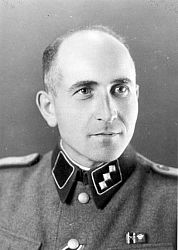
Maximilian Grabner was an Austrian Gestapo chief in Auschwitz. At Auschwitz he was in command of the torture chamber Block 11, where he gained a reputation of brutality. He was executed for crimes against humanity in 1948.
Ernst Krankemann was an infamous Kapo in Auschwitz concentration camp.
Detlef Siebert is a German television writer, director and producer, working in the United Kingdom.
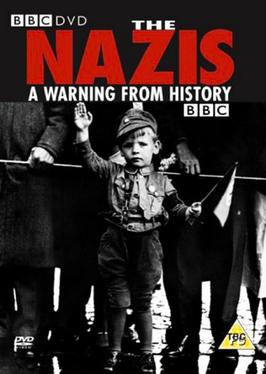
The Nazis: A Warning from History is a 1997 BBC documentary film series that examines Adolf Hitler and the Nazis' rise to power, their zenith, their decline and fall, and the consequences of their reign. It featured archive footage and interviews with eyewitnesses and was shown in six episodes.

Robert Jan van Pelt is a Dutch author, architectural historian, professor at the University of Waterloo and a Holocaust scholar. One of the world's leading experts on Auschwitz, he regularly speaks on Holocaust related topics, through which he has come to address Holocaust denial. He was an expert witness in Deborah Lipstadt's successful defence in the civil libel suit brought against her by British author and Holocaust denier David Irving in 1996.

Wilhelm Brasse was a Polish professional photographer and a prisoner in Auschwitz during World War II. He became known as the "famous photographer of Auschwitz concentration camp." His life and work were the subject of the 2005 Polish television documentary film The Portraitist (Portrecista), which first aired in the Proud to Present series on the Polish TVP1 on 1 January 2006.
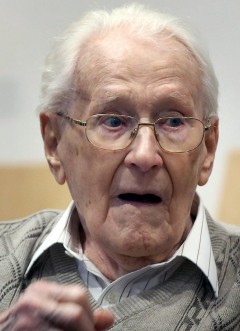
Oskar Gröning was a German SS Unterscharführer who was stationed at the Auschwitz concentration camp. His responsibilities included counting and sorting the money taken from prisoners, and he was in charge of the personal property of arriving prisoners. On a few occasions he witnessed the procedures of mass killing in the camp. After being transferred from Auschwitz to a combat unit in October 1944, Gröning surrendered to the British at the end of the war; his role in the SS was not discovered. He was eventually transferred to the UK as a prisoner of war and worked as a farm labourer.

World War II Behind Closed Doors: Stalin, the Nazis and the West is a 2008 six-episode BBC/PBS documentary series on the role of Joseph Stalin and German-Soviet relations before, during, and after World War II, created by Laurence Rees and Andrew Williams.

Kazimierz Piechowski was a Polish engineer, Boy Scout during the Second Polish Republic, and political prisoner of the Nazis held at Auschwitz concentration camp. He was a soldier of the Polish Home Army, and again became a political prisoner under the post-war communist government of Poland for seven years.
David Dario Gabbai was a Greek Sephardi Jew and Holocaust survivor, notable for his role as a member of the Sonderkommando at Auschwitz. He was deported to the camp in March 1944 and put to work in one of the crematoria at Birkenau, where he was forced to assist in burning the bodies of hundreds of thousands of Hungarian Jews that were deported to the camp during the spring and summer of that year.

Kalman Taigman also Teigman Hebrew: קלמן טייגמן was an Israeli citizen who was born and grew up in Warsaw, Poland. One of the former members of the Jewish Sonderkommando who escaped from the Treblinka extermination camp during the prisoner uprising of August 1943, Taigman later testified at the 1961 Eichmann Trial held in Jerusalem.
Dramatic portrayals of Reinhard Heydrich number among the more numerous of any Second World War figure, comparable to Adolf Hitler as well as war films depicting Erwin Rommel. Reinhard Heydrich has been portrayed in both television and film, and was one of the few high ranking Nazis to be depicted in a dramatic film while the Second World War was still ongoing.










